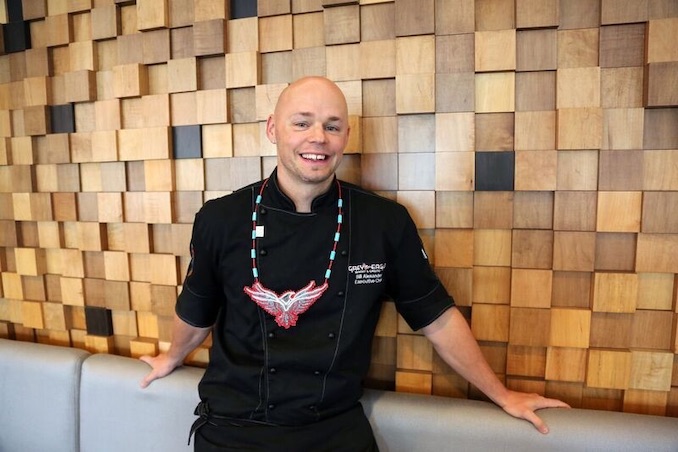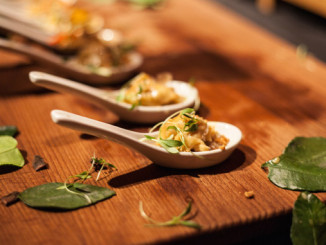Indigenous cuisine is gaining more and more attention from locals and tourists alike. Thanks to leaders in the culinary scene, we’re becoming more educated — and the more educated, the more enthusiastic we are getting. At the recent Terroir Symposium in Toronto, Indigenous Executive Chef Bill Alexander spoke with industry insiders as well as food enthusiasts about what’s happening in Canada from the process of educating people to discussing land to food practices.
Chef Alexander has worked all over the world. His early years were spent with his family in Ontario and Western Quebec. His childhood was spent farming, hunting, gardening and trading with neighbours and coming together over food. This is where his strongest foundation was born. His family thrived off the land and appreciating where food came from and his passion for food originated.

Chef Alexander is a Cordon Bleu trained chef who has extensive global experience. Believing that food brought people together he wanted to see if it applied to other cultures. He travelled to explore and work in many kitchens globally including Australia, Japan, New Zealand, Germany, Italy, Prague, and the US before returning to Canada. He has been the Executive Chef for various places such as Marriott Hotels, Military & Defence Head Quarters, Various Conference Centres & hotels, several restaurants as well as consulted on 15+ menu concepts for 3rd party business owners. Bill is a decorated chef winning various culinary competitions and awards over the years as well as an accomplished motivational speaker and leader. But that’s not all! He also chef at the restaurant located at the beautiful Grey Eagle Resort & Casino in Calgary that’s owned by the Tsuut’ina Nation where he shares a bit of the culture through food and he’s the first-ever Indigenous consulting chef for WestJet working on bringing dishes inspired by the culture. He also actively supports and helps direct the Indigenous Tourism Association of Canada in the development of a strategy to grow Indigenous culinary tourism in Canada.
We had the opportunity to chat with Chef Alexander recently to learn more…
Within the culture, everyone is taught the importance of knowing where your food comes from. Can you tell us more?
Chef Alexander: My menu philosophies of “Land to Food” practices have been instilled in my upbringing since I was a small child. The relationship between our people and mother nature is one of my most sacred foundational beliefs I possess as an indigenous person and chef. We believe that mother nature is its own living spirit who helps provide and guide us to live off the land. We believe that it is not our right to take from the land, but more so a privilege that we must value, teach, and respect. This involves knowing and respecting your land, and never taking more than you need or depleting any resources. These would be the same beliefs if you were foraging for plants, or hunting for game and the overall give and take relationship between our people and mother nature is what allows us to know exactly where our food is coming from. Land to food is a relationship of respect and sacrifice, with the highest form of praise and honor in knowing why, and how it was provided and linked to our survival. There is never anything in vain or without purpose.
What are some of the general misconceptions about Indigenous cuisine?
Chef Alexander: Some of the misconceptions about indigenous cuisine is that it’s new or a fad, or that we are simply limited to items such as bannock or fry bread. Indigenous cuisine has been around for thousands of years and has inspired some of the major food trends that we are seeing today. Take charcuterie boards as an example. Indigenous people were some of the first people to master preserving of meats. We specialized in drying and curing of proteins so that we could use them at later dates. Dried meats and pemmican’s served as some of the first examples of jerky or versions of chutneys that one might see on a charcuterie board today. Another example of trendsetting would be that a traditional indigenous diet of living off the land would consist of berries, fruit, and vegetables off the land, as well as hunted wild game. This would translate into a moderately high protein, low carb, and good fat diet. If you look closely at this diet it begins to sound a great deal like the modern-day KETO diet.
We are very proud that we are known for our bannock and our frybread, but we are so much more than those two items. Indigenous cuisine is not new, it is not a fad, and we have a lot to share and teach and look forward to the future.
Indigenous cuisine is gaining attention in the food world. What do you wish people to know?
Chef Alexander: I would like people to know that this is only the beginning and to keep the interest coming. There are so many indigenous experiences that are popping up all around Canada and in most of these cases, an important pillar of these experiences is centred around food. Food is our conduit to share our culture with you so that we can all grow together and understand each other. I want to create experiences whereby people can experience indigenous cuisine while simultaneously learning about our culture. This is where we will turn moments into memories and build long-lasting relationships.
It’s also fuelling our travel industry, what are you seeing?
Chef Alexander: I am seeing a genuine interest in the want to experience and understand the indigenous culture. Travellers coming into Canada are asking where they can go to have an authentic indigenous experience. The want and the excitement are there, so now the fun part begins of matching guest wants with specific indigenous experiences. There are many market ready indigenous experiences throughout Canada that are ready for guests to enjoy. Every day more and more of these businesses are putting the final touches on experiences they are ready to share with wanting guests so the near future for indigenous tourism looks very exciting.
Who are some of the chefs we should be keeping an eye on?
Chef Alexander: There are some really great indigenous chefs doing some great things right now helping to shape the indigenous culinary future. A few examples of these chefs are Chef Joseph Shawana of Ku-Kum Kitchen in Toronto, Chef Christa Bruneau-Guenther Feast Café Bistro in Winnipeg, Chef Shane Chartrand of SC Restaurant of River Cree Resort & Casino in Enoch Alberta and Chef Murray McDonald of Spirit Ridge Resort in British Columbia. There are many more indigenous chefs already cooking but these chefs are great people with great values with strong indigenous community ties and beliefs, not to mention they all make great tasting and innovative indigenous food.
You’ve been an Executive Chef in various global hotels and have worked in kitchens around the world including, Japan, Australia, Italy, New Zealand, and Germany. What inspired you to return to Canada?
Chef Alexander: I travelled the world to learn as much about other cultures as I possibly could, and as a result, learned a great deal about myself in the process. I learned that food is its own universal language and that in every culture, it serves the purpose of bringing people together. All of these sentiments we extremely valuable to me and crucial to my career as a Chef, but the idea of food bringing people together in every culture just reinforced for me that I was missing my home and my Canadian culture. As a result, I came back home to Canada to put everything I had learned about myself and other cultures to the test only this time it would be around bringing tourist to my indigenous experiences instead of me living the life of a tourist.
We’ve learned that you’re the first-ever Indigenous consulting chef for airline WestJet. Can you give us a hint on what people can expect?
Alexander: Yes, this is a great honour to me and I believe this is such an important step in the right direction. I am very excited about being able to share a bit of our Indigenous culinary inspiration with so many travellers coming from all directions of the world. This partnership with WestJet is a very special one that will continue to grow and develop over the years to come. It will be ever evolving in order to continually create the most authentic Indigenous experiences to our travelling guests. Without letting too much out of our surprise bag, I can tell you that guests at the very least can expect to experience indigenous menu items within, Business, Premium, and Economy Seating in both International and Domestic flights. The rest I will have to keep a secret for the time being?
What dish offers you comfort and memories?
Chef Alexander: The Dish that offers me the most comfort and memories is Slow Smoked, Elk Rack Rolled in Saskatoon jam & puffed rice. Served w/Mashed Sweet Potatoes Roasted Root veg.
This dish pays homage to a sacred animal that plays an important role for many Indigenous Peoples and their traditions; such as clan name, protector of women and it is associated with a man’s hunting prowess. As a young boy, this was the first animal that my family and I hunted for, and holds a special place as it was when I truly learned about the respect and sacrifice. Sweet potato and root vegetable combination pays homage to our planting and gathering techniques and reflects on our use of seasonal cooking.
This dish is completely from the land and is perfectly combined with the teachings I received from those who came before me.
Thanks to Chef Alexander for taking the time to take our questions. Stay tuned in the coming months as we’ll be diving deeper into Indigenous travel and cuisine in Canada.




